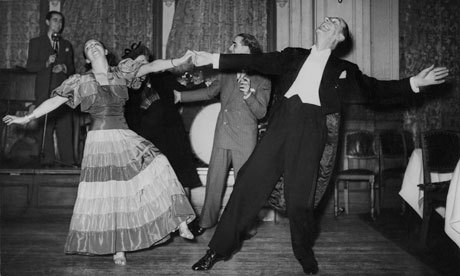
"The Savoy of this period, like London's other grand hotels, was a locus of powerful resentment: a building that symbolised the tenacity of privilege during wartime. There was even a word that went with it – Ritzkrieg – the campaign through which rich Londoners protected their perks and pleasures. But it was also possible to see it as the site of a peculiarly British form of resistance – a place in which quickstepping and drinking pink gin became a patriotic activity; where socialites bibbed for England to demonstrate that Hitler was not sufficiently powerful to disrupt the rituals of cocktail hour. The grand hotels were sensible places to make such a stand. The Dorchester reminded wartime guests that it was, at the skeletal level, a mesh of thick metal cables sunk into a raft of reinforced concrete. The Ritz ballyhooed the fact that its Belle Epoch curlicues concealed steel girders worthy of an American skyscraper. (They neglected to mention that the steel was German.) And under this somewhat illusory impression of safety, the statesmen, spooks and five-star refugees checked in. The Savoy, the Dorchester, the Ritz, Claridge's: each one became a kind of Casablanca.
At the Savoy, journalists filed articles from makeshift offices carved from the carcasses of once-expensive suites. Con artists and swindlers, invigorated by the opportunities brought by war, hunted for victims among the potted palms. Illegal abortionists, profiting from the wartime increase in unwanted pregnancies, conducted their business behind locked hotel-room doors. Spies and spymasters made the grand hotels into thriving centres of espionage, using quiet suites for debriefings and interrogations and picking at the plasterwork for hidden microphones. MI5 booked a suspected Nazi double agent called Stella Lonsdale into a room at the Waldorf, and waited for her to crack. Guy Burgess installed a pair of spies at the Dorchester, one a painfully handsome 19-year-old with 10 targets on his watch list – mainly homosexual Magyars (Hungarians) who were charmed by his unfingermarked good looks. "The whole place," shuddered the head of Special Branch, "is crawling with foreigners."
No comments:
Post a Comment